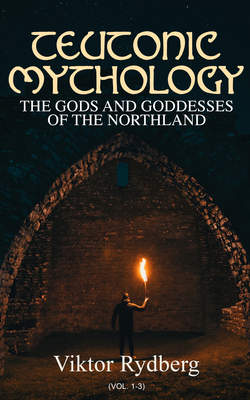Читать книгу Teutonic Mythology: The Gods and Goddesses of the Northland (Vol. 1-3) - Viktor Rydberg - Страница 41
На сайте Литреса книга снята с продажи.
27.
SORCERY THE REVERSE OF THE SACRED RUNES. GULLVEIG-HEIDR, THE SOURCE OF SORCERY. THE MORAL DETERIORATION OF THE ORIGINAL MAN.
ОглавлениеTable of Contents
But already in the beginning of time evil powers appear for the purpose of opposing and ruining the good influences from the world of gods upon mankind. Just as Heimdal, "the fast traveller," proceeds from house to house, forming new ties in society and giving instruction in what is good and useful, thus we soon find a messenger of evil wandering about between the houses in Midgard, practising the black art and stimulating the worst passions of the human soul. The messenger comes from the powers of frost, the enemies of creation. It is a giantess, the daughter of the giant Hrimnir (Hyndlulj., 32), known among the gods as Gulveig and by other names (see Nos. 34, 35), but on her wanderings on earth called Heidr. "Heid they called her (Gulveig) when she came to the children of men, the crafty, prophesying vala, who practised sorcery (vitti ganda), practised the evil art, caused by witchcraft misfortunes, sickness, and death (leikin, see No. 67), and was always sought by bad women." Thus Völuspa describes her. The important position Heid occupies in regard to the corruption of ancient man, and the consequences of her appearance for the gods, for man, and for nature (see below), have led Völuspa's author, in spite of his general poverty of words, to describe her with a certain fulness, pointing out among other things that she was the cause of the first war in the world. That the time of her appearance was during the life of Borgar and his son shall be demonstrated below.
In connection with this moral corruption, and caused by the same powers hostile to the world, there occur in this epoch such disturbances in nature that the original home of man and culture—nay, all Midgard—is threatened with destruction on account of long, terrible winters. A series of connected myths tell of this. Ancient artists—forces at work in the growth of nature—personifications of the same kind as Rigveda's Ribhus, that had before worked in harmony with the gods, become, through the influence of Loke, foes of Asgard, their work becoming as harmful as it before was beneficent, and seek to destroy what Odin had created (see Nos. 111 and 112). Idun, with her life-renewing apples, is carried by Thjasse away from Asgard to the northernmost wilderness of the world, and is there concealed. Freyja, the goddess of fertility, is robbed and falls into the power of giants. Frey, the god of harvests, falls sick. The giant king Snow and his kinsmen Thorri (Black Frost), Jökull (the Glacier), &c., extend their sceptres over Scandia.
Already during Heimdal's reign, after his protégé Borgar had grown up, something happens which forebodes these terrible times, but still has a happy issue.
